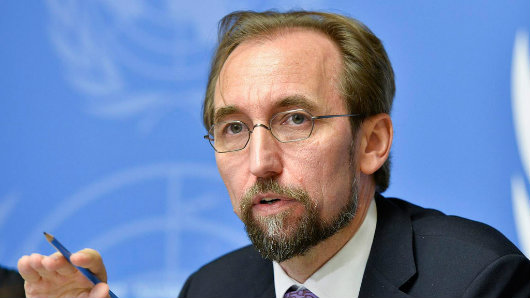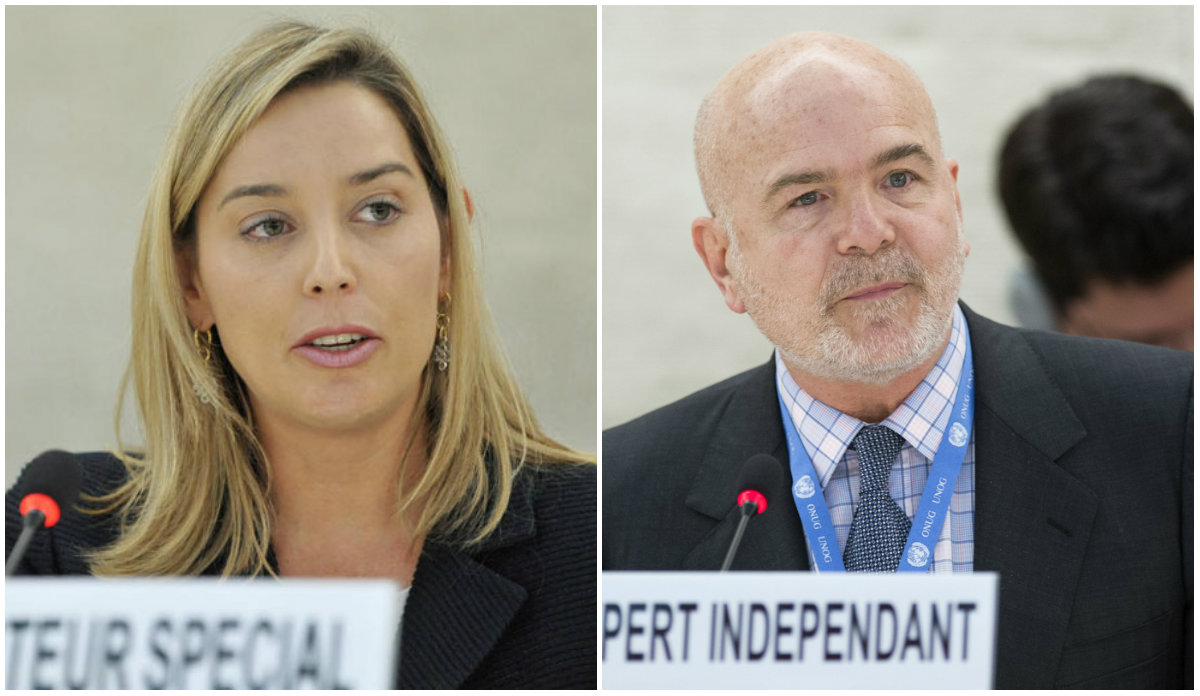UN Special Rapporteur for the Independence of Judges and Lawyers, Gabriela Knaul, has expressed “deep concern” over the failure of the judicial system to address “serious violations of human rights” during the Maldives’ 30 year dictatorship, warning of “more instability and unrest” should this continue to be neglected.
“It is indeed difficult to understand why one former President is being tried for an act he took outside of his prerogative, while another has not had to answer for any of the alleged human rights violations documented over the years,” wrote Knaul, in her final report to the UN Human Rights Council following her Maldives mission in February 2013.
The report is a comprehensive overview of the state of the Maldivian judiciary and its watchdog body, the Judicial Services Commission (JSC). Knaul examines the judiciary’s handling of the trial of former President Nasheed, the controversial reappointment of unqualified judges in 2010, and the politicisation of the JSC.
Knaul also examines parliament’s failure to pass critical pieces of legislation needed for the proper functioning of the judiciary and “legal certainty”, as well as raises serious concerns about an impending budget catastrophe facing the judicial system.
“The immediate implications of the budget cuts on the judiciary are appalling. For instance, the Department of Judicial Administration only has funds to pay staff salaries until November 2013 and it had to cancel training this year,” Knaul notes.
“The Civil Court reported that it would not have sufficient funds to pay its staff salaries after October 2013; furthermore, existing budgetary resources would not be sufficient to pay for utilities and facilities after June 2013,” she adds.
The Nasheed trial
Former President Mohamed Nasheed is currently facing criminal charges in the Hulhumale’ Magistrate Court for his detention of the Criminal Court’s Chief Judge, Abdulla Mohamed, days prior to the controversial transfer of power in February 2012.
“Judge Abdulla had allegedly shielded a number of powerful politicians in corruption cases by refusing to issue orders to investigate, and many complaints had been made regarding his conduct and supposed lack of ethics,” Knaul outlined.
“The Judicial Service Commission had completed an investigation on him in November 2011, holding him guilty of misconduct. This decision was appealed to the Civil Court, which ordered that the Judicial Service Commission’s complaint procedure be suspended.
“Although the Commission appealed the Civil Court’s ruling, Judge Abdulla was allowed to continue in his functions,” she added.
The opposition Maldivian Democratic Party (MDP) maintain the case against Nasheed is a politically-motivated attempt to convict and bar him from the September 7 presidential elections, while the new government has emphasised the judiciary’s independence and insisted on its policy of non-interference.
Following Knaul’s visit and her departure statement, several members of the JSC have also challenged the commission’s creation of the Hulhumale’ Court, and its appointment of the bench. The commission includes several of Nasheed’s direct political rivals, including a rival presidential candidate, resort tycoon, Jumhoree Party (JP) Leader and MP Gasim Ibrahim.
“The trial of the former President raises serious concerns regarding the fairness of proceedings,” Knaul notes, questioning the constitutionality of the Hulhumale’ Court and the appointment of the three-member panel of judges, “which seems to have been set up in an arbitrary manner, without following procedures set by law.”
“According to the law, the Prosecutor General’s office should have filed the case of Mr Nasheed with the Criminal Court. While the concerns of the Prosecutor General’s office regarding the evident conflict of interests in this case are understandable, since Judge Abdulla sits in this court, it is not for the Prosecutor to decide if a judge is impartial or not,” stated Knaul.
“The Prosecutor should act according to the law when filing a case, as it is the duty of judges to recuse themselves if they cannot be impartial in a particular case,” she explained.
“All allegations of unfair trial and lack of due process in Mr Nasheed’s case need to be promptly investigated, including the claims that the trial is being sped up to prevent Mr Nasheed’s participation in the 2013 elections,” she added.
Knaul noted a decision by the Supreme Court to declare the Hulhumale’ Magistrate Court as legitimate after the Commission filed a case with it in 2012.
“The Special Rapporteur was informed that the judge of the Supreme Court who cast the deciding vote in this case also sits as a member of the Judicial Services Commission, whose decision to establish the Hulhumalé court as a magistrates court was under review,” the report noted.
Politicisation of the JSC
Knaul observed that the JSC had a “complicated” relationship with the judiciary, given that the commission “considers that it has exclusive jurisdiction over all complaints against judges, including over criminal allegations, while the Prosecutor General understands that the criminal investigation agencies have the competence to investigate criminal conducts by anyone.”
Knaul underlined that “judges and magistrates, as well as other actors of the justice system, are criminally accountable for their actions. Criminal actions entail consequences and penalties that are different from those resulting from disciplinary or administrative investigations.”
The special rapporteur stated that there was near unanimous consensus during her visit that the composition of the JSC – which draws members from sources outside the judiciary, such as parliament, the civil service commission and others – was “inadequate and politicised”. This complaint was first highlighted in a report by the International Committee of Jurists (ICJ) in 2010.
“Because of this politicisation, the commission has allegedly been subjected to all sorts of external influence and has consequently been unable to function properly,” said Knaul.
State of the courts
Conflicts of interest and the resulting impact on judges’ impartiality was also a concern, noted Knaul.
“It seems that judges, and other actors of the State, do not want to fully acknowledge and understand this concept, leading to the dangerous perception from the public that the justice system is politicised and even corrupted,” she said.
Knaul also expressed “shock to hear that many members of the judiciary, including in the Supreme Court, hold memberships in political parties.”
The Supreme Court, she noted, has meanwhile been “deciding on the constitutionality of laws ex-officio, without following appropriate examination procedures, under the understanding that they are the supreme authority for the interpretation of the Constitution.”
The relationship between prosecutors and the judiciary was also difficult, Knaul noted, expressing “serious concern” that some courts “use the threat of contempt of court and disbarment to impose their decisions and superiority over prosecutors.”
“The lack of a centralised case-management system does not facilitate their tasks either. In some places, such as Addu City, one prosecutor covers four courts and is often called to different hearings at the same time,” she observed.
“Symbolic” reappointment of judges
Two months prior to the end of the constitution’s transitional period and the deadline for the appointment of new judges according to moral and professional criteria – article 285 – the interim Supreme Court informed President Nasheed “that all its members would permanently remain on the bench.”
This action, Knaul noted, had “no legal or constitutional basis.”
“The five judges who had been sitting on the transitional bench were appointed to the seven-member permanent bench, leaving many with the perception that the Supreme Court was appointed in a politicised manner,” she noted.
The rest of the courts followed suit several months later at the conclusion of the interim period, with the Commission “opting for interpreting article 285 of the Constitution in a rather symbolic way and [not scrutinising] judges’ qualifications thoroughly.”
“For instance,” Knaul noted, “not all criminal allegations pending against judges were investigated. This resulted in a seemingly rushed reappointment of all sitting judges but six, which in the opinion of many interlocutors corrupted the spirit of the constitutional transitional provision.”
While the 2008 Constitution had “completely overturned the structure of the judiciary”, at the conclusion of the JSC’s work on article 285, “the same people who were in place and in charge, conditioned under a system of patronage, remained in their positions.”
As a result, “many believe that some judges who are currently sitting lack the proper education and training […] A simple judicial certificate, obtained through part-time studies, is the only educational requirement to become a judge.”
Way forward
Knaul’s report contains four pages of recommendations for judicial reform, starting with a “constitutional review” of the composition of the Judicial Services Commission – the same conclusion reached by the ICJ in 2010.
“The Maldives finds itself at a difficult crossroad, where the democratic transition is being tested, while remnants of its authoritarian past are still hovering,” Knaul observed, stating that the power struggle she witnessed during her visit had “serious implications on the effective realisation of the rule of law in the Maldives.”
Among many other recommendations, Knaul called on the government to show “strong and nonpartisan leadership”, by pushing for “constructive dialogue aimed at establishing clear priorities for the country, the adoption of necessary core legislation, and policy measures to consolidate the democracy. Such leadership should be guided by the Maldives’ obligations under international human rights law, which provide for a sound and sustainable foundation for democracy.”
She also noted that “the delicate issue of accountability for past human rights violations also needs to be addressed.”
Read the full report
Likes (4)Dislikes
(4)Dislikes (0)
(0) 

